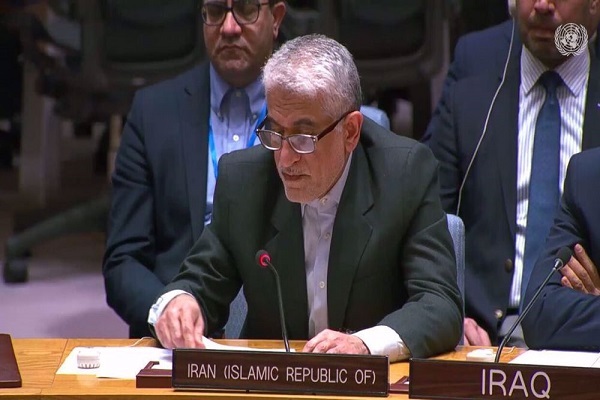
TABNAK, Jan 17: In identical letters addressed to UN Secretary-General António Guterres and the rotating President of the Security Council, Amar Bendjama, Amir Saeid Iravani responded to a report of the Panel of Experts on Yemen.
The Panel frequently assumed the Houthis' limited capabilities to support its claim of their affiliation with "foreign trainers" and receipt of "external assistance," and also it concluded that similarities between Houthi-operated materials and those linked to Iran "indicate" technical support from Iran, noted the envoy.
“However, after thoroughly reviewing the alleged evidence, Iranian authorities categorically rejected these claims, including the supposed similarities between confiscated weapons and Iranian productions,” Iravani wrote in the letters.
Iran's ambassador and permanent representative to the UN emphasized that weapon similarities alone cannot establish their origin or prove Iranian involvement.
“Such claims are unfounded, as similar weapons can be manufactured worldwide through reverse engineering, and the technology in question is neither advanced nor exclusive to Iran. Moreover, the photos and images presented by the Panel lack credibility and fail to meet the standard of reliable evidence. Regrettably, the Panel has compromised its own credibility by relying on speculative assumptions instead of providing substantiated and verifiable facts,” he said.
The senior Iranian diplomat stressed that a significant portion of the report relies on "vague and unreliable" references, including so-called “sources,” “confidential sources,” and “multiple sources,” undermining its credibility with biased and unsubstantiated claims.
He also roundly repudiated the allegations in paragraph 67 of the report regarding “the level of coordination between Ansarullah, the Islamic Republic of Iran, and other resistance groups” concerning Operation True Promise against Israeli assets within the occupied territories.
“This operation was exclusively an Iranian military initiative, undertaken in the exercise of its inherent right to self-defense. It was a direct and proportional response to the Israeli terrorist attack on Iranian diplomatic premises in Damascus on April 1, 2024 – a blatant violation of fundamental principles of international law, particularly the inviolability of diplomatic premises and representatives. Such baseless claims seek to distort the legitimate nature of Iran's response to an unlawful act of aggression,” Iravani stated.
Iran’s UN ambassador also stated that his country has never had proxy groups nor considers other nations in the region as proxies.
“Ansarullah are a part of the legitimate government in Sana'a and operate with full political independence, making decisions and taking actions based solely on their own interests and priorities. Therefore, their activities and decisions have no connection to the Islamic Republic of Iran,” he said.
Iravani noted that the final report of the Panel of Experts on Yemen contains "inaccurate and unsupported political analyses" regarding the root causes of regional instability.
“It disregards the interconnectedness of the Gaza crisis with the Yemenis' faith, religious beliefs, and commitment to Palestine, as evidenced by the flawed analysis in paragraph 7. This omission reflects a deliberate bias that further undermines the report's validity.
“Furthermore, the ongoing military aggressions conducted by the United States, the United Kingdom, and Israel against the sovereignty and territorial integrity of Yemen and the bombing of Yemen's vital and civilian infrastructure constitute clear violations of the UN Charter, international law, and relevant Security Council resolutions,” the Iranian diplomat said.
Iravani added that such unlawful actions not only endanger international peace and security, but also exacerbate Yemen's already dire humanitarian crisis.
He noted that the Islamic Republic of Iran, as a responsible member of the United Nations, fully complies with its obligations under international law and is committed to relevant UN Security Council resolutions on Yemen.
“Iran categorically denies the claims of violations of arms embargoes or involvement in fueling conflicts in Yemen or elsewhere propagated by certain members of the Security Council," said the envoy, noting that Tehran fully complies with its obligations under international law and is committed to relevant UN Security Council resolutions on Yemen.
"From the outset of the Yemen crisis, Iran has consistently supported a political resolution, advocating for a comprehensive ceasefire, inclusive dialogue, and a peaceful process that upholds Yemen's sovereignty and territorial integrity,” Iravani stressed.